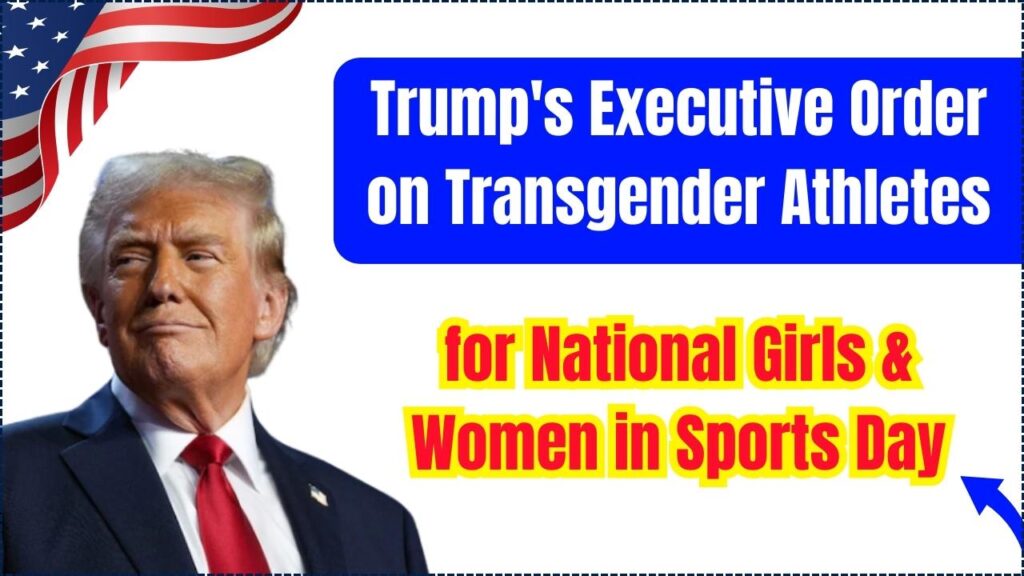
Trump’s Executive Order on Transgender Athletes: On February 5, 2025, coinciding with National Girls & Women in Sports Day (NGWSD), former President Donald Trump signed an executive order restricting transgender women and girls from competing in female sports categories. The executive order, titled “Keeping Men Out of Women’s Sports”, mandates that educational institutions receiving federal funding must enforce sex-specific sports categories based on biological sex at birth.
This decision has sparked national debates on fairness, inclusivity, and the rights of transgender athletes. While supporters argue that this protects competitive integrity, critics claim it excludes and discriminates against transgender individuals. This article explores what this executive order entails, how it affects women’s sports, Title IX policies, legal implications, and the broader impact on National Girls & Women in Sports Day.
Trump’s Executive Order on Transgender Athletes
| Feature | Details |
|---|---|
| Executive Order Title | Keeping Men Out of Women’s Sports |
| Signed By | Former President Donald Trump |
| Date of Signing | February 5, 2025 |
| Policy Objective | To ensure that women’s sports are reserved for biological females |
| Affected Areas | Schools, colleges, universities receiving federal funding |
| Implications | Transgender women and girls may be barred from competing in female sports categories |
| Legal Challenges Expected? | Yes, civil rights and LGBTQ+ organizations are likely to file lawsuits |
| Official Resources | White House, Department of Education |
Trump’s executive order on transgender athletes has sparked one of the most significant debates in modern sports policy. While the order aims to protect competitive fairness, it has led to legal and ethical concerns about LGBTQ+ rights, inclusivity, and the future of women’s sports.
As legal challenges unfold, the implications of this order will shape the landscape of women’s athletics for years to come. Whether the order remains in effect or is overturned by future court rulings or administrations, it is a pivotal moment in the ongoing conversation about gender, identity, and fairness in sports.
Understanding Trump’s Executive Order on Transgender Athletes
What Does the Executive Order Say?
The executive order mandates that women’s sports categories should be protected from biological male participation, arguing that:
- Transgender women and girls should not be allowed to compete against biological females in schools and college sports.
- Institutions that permit transgender participation in women’s sports may lose federal funding.
- Title IX, originally designed to ensure gender equality in education, must be interpreted based on biological sex.
How Does It Relate to Title IX?
Title IX, a landmark law passed in 1972, ensures that no one is discriminated against in education or federally funded programs based on sex. However, this new executive order reinterprets Title IX to mean sex assigned at birth, excluding transgender girls and women from participating in female categories.
Impact on National Girls & Women in Sports Day (NGWSD)
National Girls & Women in Sports Day (NGWSD), established in 1987, is meant to celebrate female athletes, promote gender equality, and inspire young girls to participate in sports.
How the Order Affects NGWSD 2025
- The executive order’s signing overshadowed the positive celebrations of NGWSD, shifting the conversation towards exclusivity rather than inclusion.
- Advocacy groups argue that it contradicts the spirit of NGWSD, which supports all girls and women in sports.
- Supporters claim that the order protects the integrity of women’s sports, ensuring fair competition.
Reactions to Trump’s Executive Order
Supporters Say:
- Protects the integrity of female sports and ensures fair competition.
- Keeps biological males from dominating female sports categories.
- Encourages more participation in women’s sports by biological females.
Opponents Say:
- Violates LGBTQ+ rights and excludes transgender athletes.
- Misinterprets Title IX protections, which were expanded in recent years to include gender identity.
- May lead to federal lawsuits, as civil rights organizations plan to challenge the order in court.
Legal Challenges & Future Implications
Several LGBTQ+ advocacy groups, civil rights organizations, and athletes have vowed to challenge the order in federal court, citing discrimination.
$8,046 EITC Refund Status in 2025: Will you get it or not? Check Here
This Week’s Social Security Changes: Steps Retirees Need to Take Right Now
Potential Legal Arguments Against the Executive Order:
- Violates the Equal Protection Clause of the 14th Amendment.
- Contradicts previous Title IX interpretations that support gender identity protections.
- Sets a precedent that could impact future gender-related policies beyond sports.
Will This Order Be Overturned?
- Legal experts suggest that it could be blocked by courts as lawsuits progress.
- The next presidential administration could rescind or modify the order.
FAQs On Trump’s Executive Order on Transgender Athletes
Q1: Does this executive order ban all transgender athletes?
No, it specifically targets transgender women and girls competing in female sports categories. It does not impact transgender men participating in men’s sports.
Q2: Can schools lose funding if they don’t comply?
Yes, federally funded institutions that allow transgender participation in women’s sports risk losing federal financial aid.
Q3: How will this affect college and high school sports?
- NCAA and high school federations may need to revise policies to comply with federal funding requirements.
- Some states may choose to oppose the order, leading to legal battles between state and federal policies.
Q4: What do major sports organizations say?
- The International Olympic Committee (IOC) and NCAA have yet to issue official responses.
- The Women’s Sports Foundation and ACLU strongly oppose the order and may challenge it in court.
Q5: Will transgender athletes be able to compete at all?
- They may still compete in open categories or in male sports divisions, but will not be allowed in female categories.








